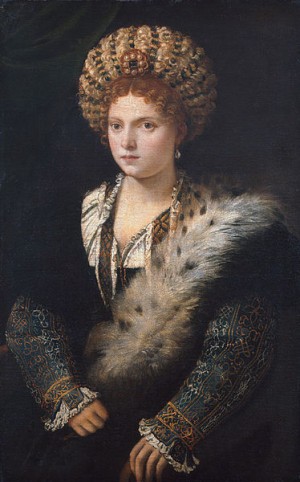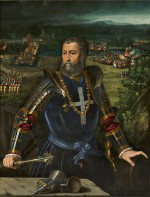Isabella d'Este
Sister of Duke Alfonso I d’Este and wife of Marquess Francesco Gonzaga of Mantua, the marchioness was a great admirer of the work of Ludovico Ariosto, who was on numerous occasions thrilled to be able to give the noblewoman a preview of progress on his epic Orlando Furioso.
Protector of Writers and Artists
There were two women in the court of Este who catalysed the attention of Ariosto: Lucrezia Borgia, wife of Alfonso I d’Este; and Isabella d’Este, sister of the latter and daughter of Ercole I. While he eulogised the extraordinary beauty of Lucrezia in song, it was for Isabella, marchioness of Mantua, whom he expressed his most vivid admiration not only for her charm, but for her brilliant mind, open to culture and sensitive to the arts. It was she who personified more than any other woman of the renaissance the ideal of intelligent and cultured woman, and she was the first to appreciate the quality of Orlando Furioso and delight in the adventures narrated within it. Ariosto used the words of the sage Melissa to describe the marchioness of Mantua,
To hear of one of thy famed race prepare,
Whom liberal studies and good works engage;
Of whom, I know not well, if she more fair
May be entitled, or more chaste and sage;
The noble-minded Isabel, who, where
It stands on Mincius’ bank, in other age
Shall gild the town, of Ocnus’ mother hight,
….
Where, with her worthiest consort she will strain,
In honoured and in splendid rivalry
…
Great things and many thus I sum in few
Of this brave dame, and others leave behind:
…
And with this finish my prophetic strain,
All blessings on her head the skies will rain.
(Orlando Furioso, Canto 13, 59 -61)
Isabella d’Este was mentor to writers and artists, promoting the works and studies of all those who demonstrated sufficient talent or desire, not sparing help and encouragement even to mediocre artists. At the court of the Marchesana, as the marchioness of Mantua was often called, intellectuals and writers from all over Italy found hospitality, as well as artists such as Leonardo, Correggio and Mantegna. There was the Mantuan group, which included illustrious men such as Mario Equicola, Baldassar Castiglione, Francesco Virgilio; the Ferrarese group, including Boiardo, Ercole Strozzi, Battista Guarini, and obviously Ariosto; a Lombard group, to which the greatest intellectuals of the court of Ludovico il Moro belonged, such as Belincioni, Gaspare Visconti, Veronica Gambara; the Venetian group, on the other hand, included talents such as Vinciguerra, Bembo, Flaminio; from central Italy Machiavelli, Pistoia, Bibbiena; and finally, from southern Italy Cariteo and Pontano, to mention only some of the illustrious intellectuals of the Mantuan court.
Ariosto's Affections
Ariosto's affection for Isabella d’Este is well documented by the letters which detail the relationship of reciprocal esteem between the poet and the marchioness across numerous volumes. Ariosto would certainly have got to know Isabella within the court of Este, talking to her and discussing the knights described in Orlando Furioso, of whom her favourite was Rinaldo. We also know of episodes from the period in which Isabella was already marchioness of Mantua, such as that of 1507 when, in a letter to her brother, Cardinal Ippolito I d’Este, Isabella expressed her gratitude for having sent Ludovico Ariosto to her. The marchioness, still suffering from the birth of her son Federico, was cheered by hearing some passages from Orlando Furioso, saying that thanks to these tales she had spent two days not only without discomfort, but filled with great pleasure (Bertoni 1919, p. 171). Various passages in Orlando Furioso contain clear references to the marchioness of Mantua. Among these the character of Isabella stands out, who sacrifices herself in order to remain faithful to the memory of her beloved Zerbino. As well as sharing the same name, the virtues of the woman recall the image of the marchioness of Mantua, whose qualities are described thus:
“I will that all, in every future age,
Who bear thy name, be blest with genius high;
Be courteous, gentle, beautiful, and sage,
And to the real pitch of honour fly.
(Orlando Furioso, Canto 29, 29)
In Mantua, Isabella d’Este had taken on the role of first lady, not just for her role as marchioness, but above all for that “dose of attitude and initiative and for that conduct which was so intelligent and persuasive” (Chiappini 2001, p. 193), which was not to be expected in a young woman removed from her place of origin. Isabella was able to take on and manage management duties when her husband Francesco was called on to direct his troops during the clashes with Charles VIII. Not only this, but she used her abilities to obtain the freedom of her husband from Pope Julius II when he had been taken prisoner by the Venetians. His admiration and adoration for the marchioness was such that Ariosto sent her, accompanied by a well-known letter dated 9 October 1532, the last and expanded version of his poem: “I am sending to Your Excellency a copy of my Orlando Furioso, which I have made better with corrections and increased in size by six cantos and numerous stanzas scattered here and there throughout the book. I would be falling short of my duty if I did not give Your Excellency a copy before anyone else, since I revere and adore you and since I know you are wont to like my compositions, whatever their true value.” (Lett. 55).
Sitography
Fototeca
Related Subjects
Compiling entity
- Assessorato alla Cultura e al Turismo, Comune di Ferrara
Author
- Stefania De Vincentis




